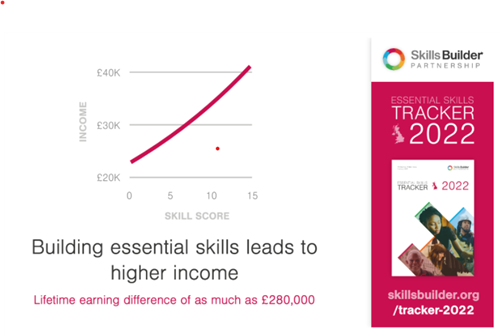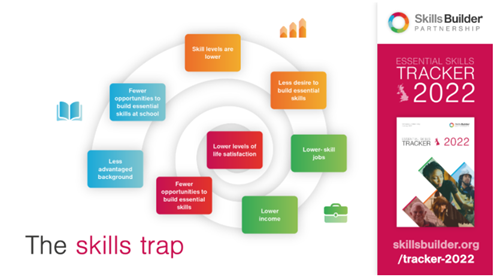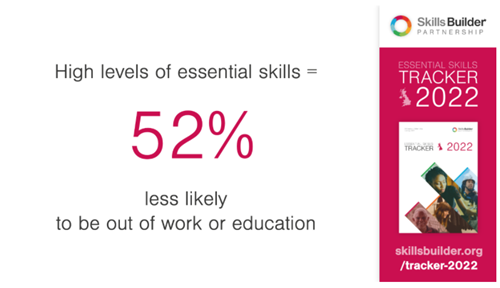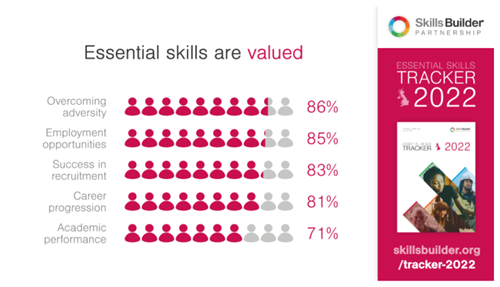Skills Builder Partnership have released a ground-breaking report that investigates the state of essential skills in the UK. What did it say, and what actions should be taken?
There’s a growing consensus that essential skills are vital for almost anything in learning, work, and wider life.
They’re a talking point among employers, who want candidates to demonstrate transferable skills like speaking and problem solving – especially in the face of an uncertain future jobs market where workers will need to move agilely between occupations. They underpin the development of literacy and numeracy, technical skills, and digital skills. And research has shown that higher levels of essential skills are associated with greater personal wellbeing and better outcomes in education and employment.
We’re also beginning to see a vocabulary around these skills emerge in government. England’s latest statutory careers guidance for secondary schools and colleges advised that “in schools, each subject should support students to identify the essential skills they should develop to identify the pathways to future careers.” Recently, the House of Lords Youth Unemployment Committee released a report urging the Government to include essential skills in the national curriculum from Key Stages 1 to 4.
All of this suggests that making sure everyone can build essential skills is hugely important.
But it’s all too easy to take these skills for granted and fail to ask some key questions. Who is building essential skills? What impacts our ability to build these skills? How do they shape our lives?
Skills Builder Partnership, a non-profit social enterprise, has launched an inaugural report called the Essential Skills Tracker to fill that knowledge gap. By mapping YouGov survey data of more than 2,200 adults to the Skills Builder Universal Framework of the eight essential skills, they’ve developed the largest and most high-definition snapshot ever captured of these skills across the UK. This research will be repeated every year, providing a baseline for essential skill levels across the country and a long-term view of factors both impacting and impacted by them.
David Jones, Vertical and Horizontal Markets Manager at NCFE, commented on the findings: “We believe that it’s important to look beyond purely academic and technical skills and focus on the core essential skills that individuals need to be included in the labour market and society – and this is strongly supported by this new research. These skills and characteristics, such as adaptability, problem solving, and critical thinking, are needed more now than ever. When the only constant is change, the only safe investment is in our ability to adapt. By developing mental fitness, confidence and resilience, we can support people to become the best version of themselves – positive about their future and ready to seize the opportunities that come their way.
"It’s clear that the UK as a whole places a high value on essential skills, but this is not always backed up by giving people real opportunities to build these skills. This is particularly evident in certain localities – essential skills are not distributed equitably, demonstrating the importance of understanding regional needs to ensure no individual is disadvantaged, regardless of where they come from.
"Essential skills need to be more than just a bolt-on, and should be fully embedded and integrated into qualifications and training both in and out of the workplace – this is something that we are committed to at NCFE, working with Skills Builder Partnership. Ultimately, investment needs to be made in interventions that build long-term skills for life, really adding to their human capital.”
So, what were the main takeaways?
At a glance
The Tracker’s findings justify the importance, timeliness, and urgency of boosting opportunities for people to develop their essential skills.
First, the positives. Essential skills are associated with increased wellbeing and an average wage premium of £3,900-£5,900. Building them means you’re 52% less likely to be out of work or education. The UK public values these skills and wants more opportunities to develop them.

But despite the benefits they bring, the Tracker finds that demand for essential skills development opportunities (83%) far outstrips supply (14%).
In addition, the Tracker exposes critical issues around inequality and social mobility. The distribution of essential skills, and the opportunities to build them, is highly uneven throughout the UK.
Alongside this skills gap, the Tracker points to an endemic “skills trap” where many from less advantaged backgrounds have fewer opportunities to build essential skills at school, meaning they leave education with lower average skill levels. They then have less desire to build essential skills, go into lower-skilled, lower-paid jobs with fewer opportunities to build essential skills, and continue to earn less than their peers with higher levels of essential skills. They’re therefore likely to have lower levels of life satisfaction and total income.
In short, it’s the most disadvantaged individuals who are also the least likely to build the very skills that improve life outcomes, creating a cycle of disadvantage and inequality.

To both bridge the gap and escape the trap, the Tracker recommends that the UK scales the volume of high-quality opportunities to build essential skills in education, through impact interventions, and in employment.
You can read the full report here, and use the interactive dashboard to explore the data.
What does the data mean for you?
For educators
84% of working-age adults in the UK believe that these skills should be taught in lessons in school and college, while 71% think they’re important for academic performance. The Tracker’s findings suggest that they’re right.
By now it’s common knowledge that teaching basic skills like literacy early on is hugely beneficial – and this applies equally to essential skills. People who build essential skills in education go on to have higher skill levels and are more likely to be in work or education, earn more money, and feel they have better career prospects as well as life satisfaction.

The Tracker therefore recommends that educators invest in developing learners’ essential skills across the board, from the early years through to further and higher education (and encourage them to keep this going throughout lifelong learning). To do this, educators will need to use a consistent language around essential skills, set benchmarks for students’ progress, and put time aside for building these skills in the classroom. Learning here must also show students how these skills relate to work, organising activities such as work experience links the classroom to the workplace.
For employers
In the workplace, there’s no mistaking the growing demand for essential skills. 83% of workers would like more opportunities to build essential skills, while 92% believe that they should form part of professional development. Meanwhile, 90% of those in professional or managerial jobs agree that essential skills are important for employment opportunities. But demand is six times higher than the available supply: only 14% of workers recall learning essential skills via structured training.
Improving essential skills leads to an average wage premium of £3,900-£5,900 – a lifetime earning difference of as much as £280,000 – which suggests that these skills boost productivity. As employers look to not only attract but retain talent, satisfying their employees’ demand for Learning & Development opportunities to build essential skills is to everyone’s benefit.
But how can they go about this? The Tracker suggests some good places to start. Approaches to building essential skills must be structured, where employees can build their skills throughout their career and receive coaching from trained staff. It’s also crucial to recognise employees’ progress through appraisals, reviews, and rewards.
Transparency should be at the heart of this, with clear definitions for terms like “teamwork” and “leadership”, to support employers in recruiting more diverse teams. In addition, being transparent and specific about which skills employers require and pointing candidates towards inclusive e-learning resources helps to upskill candidates over the recruitment process. This is an area where Skills Builder Partnership has been doing a lot of work.
Many workplaces are still working to become more representative. Employers can improve both social mobility and employability outcomes via outreach: showing how essential skills relate to the workplace, conducting insight days, work experience, and internships that allow participants from all backgrounds to build these skills, and collecting data on participants’ essential skills to increase impact.

For policymakers
Investing in essential skills pays off. By focusing purely on academic grades, basic skills, and technical skills, we’re missing a way to fundamentally improve social mobility.
Our employment market faces several challenges: a lack of reskilling, older workers leaving the workforce, youth under- and unemployment, as well as job losses to AI and automation. But the Tracker shows that building essential skills in both today’s and tomorrow’s workforce is both overwhelmingly in demand and a route to addressing these issues.
The Tracker outlines several clear actions for policymakers who work on formal education. They should put the Skills Builder Universal Framework on par with the Gatsby Benchmarks of Good Career Guidance, so that all schools and colleges have a clear, consistent, and measurable way to develop students’ essential skills, as well as a shared language and understanding of these skills. Furthermore, the Department for Education recently announced a Unit for Future Skills in the Levelling Up white paper. This Unit will need to work across departments, especially in the Department for Business, Energy, & Industrial Strategy, and the Department for Work & Pensions (DWP), to ensure alignment behind the Skills Builder approach to essential skills.
As for those policymakers focusing on employability, the Tracker recommends they embed essential skills training into the DWP’s Restart scheme and use the Universal Framework to measure outcomes. The Framework should also be applied in Youth Hubs as a tool in employability training, while Local Skills Improvement Plans should use the Tracker as a starting point to reflect on their area’s essential skills needs.
For parents and carers
Essential skills are developed in all settings – from the classroom, to the workplace, to the home. The Tracker reveals just how large the influence of parents and carers over their child’s essential skills is, which then continues to affect their child’s development through education and beyond. Individuals with higher levels of essential skills were 39% more likely to have had parents and carers who were very engaged in their education – while individuals with the lowest levels were 22% more likely to have parents and carers who were unengaged.

There’s a wealth of e-learning resources for parents and carers to support their child’s essential skills development. For example, the Skills Builder Partnership has developed Homezone, an inclusive e-learning platform that provides parents and carers with activities to build essential skills at home with their children.
It’s as important to develop and reflect on your own essential skills as it is to make sure your child is building them. Those parents and carers who value and practise the essential skills are more likely to pass that mindset onto the next generation, who’ll value and practise these skills in turn.
Next steps
Not only does the Tracker mark a turning point in how essential skills are measured and analysed, but it confirms what many have suspected – essential skills have a profound influence on every aspect of our lives, and everyone deserves an opportunity to build them. And as the Skills Builder Partnership’s Founder and CEO, Tom Ravenscroft, pointed out in the report, “the events of the last couple of years have only increased the demand for these skills.”
However, as the research has also shown, there’s a long way to go before everyone reaches an appropriate level of these skills and can access the right opportunities.
Skills Builder Partnership has a clear mission: to ensure that one day, everyone builds the essential skills to succeed. It has grown to more than 800 businesses, education institutions, and impact organisations. In 2021, the Partnership delivered 1.46 million high-quality opportunities to boost essential skills.
This Tracker underlines that these collective efforts by the Partnership to push for essential skills opportunities are enormously worthwhile. But this shouldn’t be their mission alone – it’s up to all of us both to build our own essential skills and make sure others receive the same opportunities. We’re all lifelong learners, and we’re intuitively aware of what it means to have the essential skills. Now, it’s time to become vocal advocates for them.
Get in touch
If you want to get in touch with the Skills Builder Partnership to discuss anything above, you visit the Skills Builder website, contact them via email, or go to their social media. Or, you can visit the full Tracker report and interactive data.
If you’d like to know more about how NCFE is embedding essential skills across our qualifications, please get in touch with David Jones.







